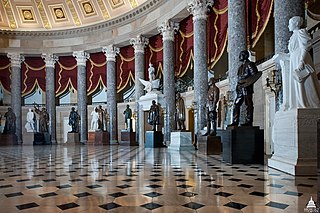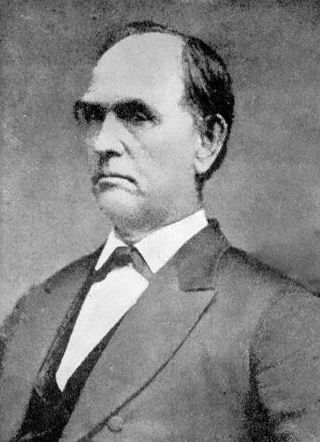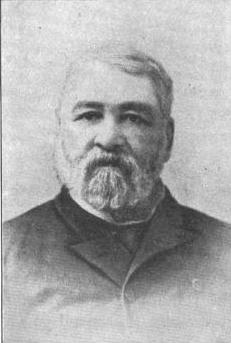Related Research Articles

The North Central Conference (NCC), also known as North Central Intercollegiate Athletic Conference, was a college athletic conference which operated in the north central United States. It participated in the NCAA's Division II.

The National Statuary Hall is a chamber in the United States Capitol devoted to sculptures of prominent Americans. The hall, also known as the Old Hall of the House, is a large, two-story, semicircular room with a second story gallery along the curved perimeter. It is located immediately south of the Rotunda. The meeting place of the U.S. House of Representatives for nearly 50 years (1807–1857), after a few years of disuse in 1864 it was repurposed as a statuary hall; this is when the National Statuary Hall Collection was established. By 1933, the collection had outgrown this single room, and a number of statues are placed elsewhere within the Capitol.

Augustus Caesar Dodge was a Democratic delegate to the U.S. House of Representatives from Iowa Territory, a U.S. minister to Spain, and one of the first set of United States Senators to represent Iowa after it was admitted to the Union as a state. His father, Henry Dodge, served as a U.S. Senator from Wisconsin; the two were the first and so far the only father-son pair to serve concurrently in the Senate, which they did from 1848 to 1855.

George Wallace Jones was an American frontiersman, entrepreneur, attorney, and judge, was among the first two United States Senators to represent the state of Iowa after it was admitted to the Union in 1846. A Democrat who was elected before the birth of the Republican Party, Jones served over ten years in the Senate, from December 7, 1848 to March 3, 1859. During the American Civil War, he was arrested by Federal authorities and briefly jailed on suspicion of having pro-Confederate sympathies.
The 100 seats in the United States Senate are divided into three classes for the purpose of determining which seats will be up for election in any two-year cycle, with only one class being up for election at a time. With senators being elected to fixed terms of six years, the classes allow about a third of the seats to be up for election in any presidential or midterm election year instead of having all 100 be up for election at the same time every six years. The seats are also divided in such a way that any given state's two senators are in different classes so that each seat's term ends in different years. Class 1 and 2 consist of 33 seats each, while class 3 consists of 34 seats. Elections for class 1 seats are scheduled to take place in 2024, class 2 in 2026, and the elections for class 3 seats in 2028.

The United States Court of Appeals for the Eighth Circuit is a United States federal court with appellate jurisdiction over the following United States district courts:

The National Statuary Hall Collection in the United States Capitol is composed of statues donated by individual states to honor persons notable in their history. Limited to two statues per state, the collection was originally set up in the old Hall of the House of Representatives, which was then renamed National Statuary Hall. The expanding collection has since been spread throughout the Capitol and its Visitor's Center.

Arthur Vivian Watkins was a Republican U.S. Senator from Utah, serving two terms from 1947 to 1959. He was influential as a proponent of terminating federal recognition of American Indian tribes, in the belief that they should be assimilated and all treaty rights abrogated. In 1954 he chaired the Watkins Committee, which led to the censure of Senator Joseph McCarthy, who had made extensive allegations of communist infiltration of government and art groups. Watkins voted in favor of the Civil Rights Act of 1957.

William Hartford James was a Republican Nebraska politician who served as the acting governor of Nebraska from 1871 to 1873. He was also a member of the University of Nebraska-Lincoln Board of Regents during his tenure as governor.
At large is a description for members of a governing body who are elected or appointed to represent a whole membership or population, rather than a subset. In multi-hierarchical bodies, the term rarely extends to a tier beneath the highest division. A contrast is implied, with certain electoral districts or narrower divisions. It can be given to the associated territory, if any, to denote its undivided nature, in a specific context. Unambiguous synonyms are the prefixes of cross-, all- or whole-, such as cross-membership, or all-state.

The Sioux City Journal is the daily newspaper and website of Sioux City, Iowa. Founded in 1864, the publication now covers northwestern Iowa and portions of Nebraska and South Dakota.

Alfred Milnes was a politician from the U.S. state of Michigan.

John Fitch Kinney was a prominent American attorney, judge, and Democratic politician. He served as Justice of the Supreme Court of Iowa, twice as Chief Justice of the Supreme Court of the Territory of Utah and one term as the Territory of Utah's Delegate in the House of Representatives of the 38th Congress.

George Calhoun Crowther was a U.S. Representative from Missouri.

The 1898–99 United States Senate elections were held on various dates in various states. As these U.S. Senate elections were prior to the ratification of the Seventeenth Amendment in 1913, senators were chosen by state legislatures. Senators were elected over a wide range of time throughout 1898 and 1899, and a seat may have been filled months late or remained vacant due to legislative deadlock. In these elections, terms were up for the senators in Class 1.

The 118th United States Congress is the current meeting of the legislative branch of the United States federal government, composed of the United States Senate and the United States House of Representatives. It convened in Washington, D.C., on January 3, 2023, and will end on January 3, 2025, during the final two years of President Joe Biden's initial term.

The 119th United States Congress is the next meeting of the legislative branch of the United States federal government, composed of the United States Senate and the United States House of Representatives. It is scheduled to meet in Washington, D.C., from January 3, 2025, to January 3, 2027, during the final weeks of the first term of Joe Biden's presidency, and the first two years of the presidential term that will occur following the 2024 United States presidential election. The elections of November 2024 will decide control of both houses.
References
- ↑ "Senator Joseph Hollman". Iowa General Assembly. Retrieved 9 June 2022.